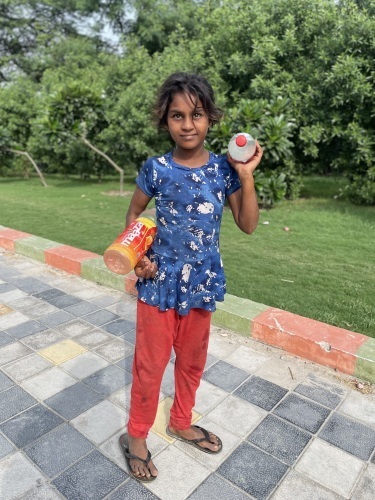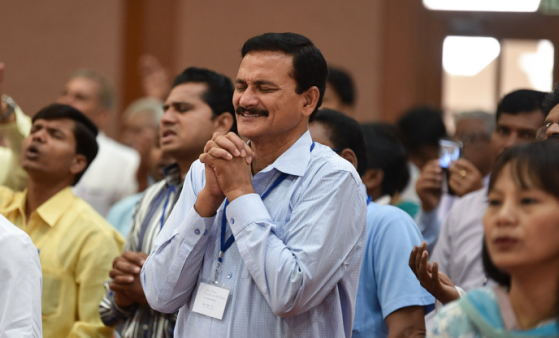
The Andhra Pradesh High Court has quashed a criminal case filed under the SC/ST (Prevention of Atrocities) Act, ruling that individuals who convert from Hinduism to Christianity automatically forfeit their Scheduled Caste status and associated legal protections. The landmark decision, delivered by Justice N Harinath on April 30, 2025, addresses the decades-old constitutional debate on religion-based reservations and protections.
“If a Scheduled Caste person converts to another religion, their caste status ceases to apply, and an atrocity case based on their complaint is not valid,” declared Justice Harinath while dismissing the criminal petition.
The case centred around Chintada Anand, a pastor from Pittalavanipalem village in Bapatla district, who had filed a complaint against Akkala Ramireddy and others under the SC/ST Act. According to court records, Anand had been conducting a church without proper permissions, to which Ramireddy and others objected. Subsequently, Anand filed a case alleging he faced caste-based abuse and threats.
The court found that Anand had been working as a pastor for over a decade. Witnesses confirmed his role in conducting Sunday prayers attended by 20-30 people. According to the complaint, Anand alleged that in December 2020, he began receiving caste-based abuses and threats through phone calls from the petitioners. He further claimed that on January 3, 2021, during a Sunday prayer session, the first petitioner physically assaulted him, and on January 24, 2021, he was intercepted and allegedly assaulted by the petitioners and about 25 others, who abused him based on his caste and threatened him and his family.
Seeking to quash the criminal case, Ramireddy and others approached the High Court. Their counsel, JV Phani Dutt, argued that since Anand had been functioning as a pastor for approximately ten years, he no longer qualified for protections under the SC/ST Act.
“Since Chintada Anand earns a living as a pastor, he is a Christian, and as per Clause 3 of the Constitution (Scheduled Castes) Order, 1950, a non-Hindu cannot be considered a Scheduled Caste member,” Dutt contended before the court. He further argued that “the concept of caste in Hinduism does not exist in Islam or Christianity worldwide,” making Anand’s complaint legally invalid.
Anand’s representative, Advocate Eerla Satish Kumar, countered that his client possessed a valid government-issued SC-Hindu certificate, which entitled him to protections under the Act. However, the court rejected this argument, ruling that “mere non-cancellation of the caste certificate by the authority to a person who has converted into Christianity cannot instil the protection granted under the Protective Legislation.”
Justice Harinath observed that when the petitioner stated he had been practicing Christianity for the past ten years, police should not have included SC/ST Act charges against him. The court emphasized that the purpose of the SC/ST Act was to protect individuals belonging to those groups, not those who have converted to other religions.
A Constitutional Anomaly: The Struggle of Dalit Christians
This judgment illuminates what many advocates term a “constitutional anomaly” that has persisted for 75 years - the exclusion of Christians and Muslims of Scheduled Caste origin from protections and reservations granted to their Hindu, Sikh, and Buddhist counterparts.
The root of this disparity lies in Paragraph 3 of the Constitution (Scheduled Castes) Order 1950, which originally stated: “Notwithstanding anything contained in paragraph 2, no person who professes a religion different from the Hindu religion shall be deemed to be a member of a Scheduled Caste.” This provision effectively restricted SC status to Hindus, though it was later amended to include Sikhs in 1956 and Buddhists in 1990.
Critics argue this provision contradicts the secular principles enshrined in the Constitution of India. The National Commission for Religious and Linguistic Minorities (NCRLM), also known as the Ranganath Misra Commission, described Paragraph 3 in 2007 as “unconstitutional” and “a black letter written outside the Constitution introduced through the back door by an executive order.”
Dr. John Dayal, prominent journalist and human rights activist, has condemned the constitutional provision: “This is one of the most humiliating and discriminatory laws on the statute books and is injurious at multiple levels,” he said while speaking with Christian Today. Dayal said that the law violates the principle of no discrimination on account of religion and belief denying not only material benefits but also protection of law to Dalit Christians in their workplaces and village or town where they suffer the caste treatment similar to those of their kind or social status in the Hindu faith. “It is humiliating because it forces followers of Christ to hide their faith if they want to retain their job or employment in a reserved category. It is the most vicious of anti-conversion laws and is applicable across the country and not just on twelve states as the anti-conversion laws currently are.” he added.
The struggle for equal status has faced repeated setbacks. In August 2022, the Union Government rejected the Ranganath Misra Commission’s recommendations through Solicitor General of India Tushar Mehta, who informed the Supreme Court: “We do not accept the Ranganath Misra Commission report as it ignored many aspects.”
Multiple government bodies have recommended extending SC status to Dalit Christians and Muslims, including the Kaka Kalelkar Backward Class Commission (1955), Elayaperumal Committee (1969), Mandal Commission (1980), High Power Panel on Minorities, SCs, STs and other Weaker Sections (1983), the Sachar Committee (2005), and the Ranganath Misra Commission (2007).
Ongoing Discrimination Despite Conversion
A central contention in this debate is whether conversion genuinely alters an individual’s social standing. Extensive research suggests it does not. Sociological studies commissioned by the National Commission for Minorities found that even after conversion to Christianity or Islam, individuals’ social position and socio-economic conditions remain largely unchanged. Society continues to treat Dalit Christians and Muslims in the same discriminatory manner as it treats other Dalits, subjecting them to exploitation and exclusion.
This reality was recently highlighted in a Supreme Court case. On February 21, 2025, the Supreme Court agreed to examine a petition by Dalit Christians from Trichy district in Tamil Nadu, who alleged caste-based discrimination within the Roman Catholic Church. The petitioners claimed they were excluded from church administration, denied participation in annual festivals, and subjected to segregated burial grounds, with Dalit deceased not allowed into the church for funeral prayers.
The petition contends that these practices violate fundamental rights guaranteed under Articles 14, 15, 17, 19, 21, and 25 of the Indian Constitution. Advocate Franklin Caesar Thomas, representing the petitioners, argued that this discrimination is “not a private dispute but a constitutional issue” warranting judicial intervention.
Even within Christian communities, vestiges of caste discrimination persist. The Catholic Bishops’ Conference of India acknowledged this reality in its 1998 statement at Varanasi: “The prevalence of the caste system, not only in society but also in some parts of the Church in India even at the close of the twentieth century, is a matter of shame and disgrace to all of us.”
Opposition to Extending SC Status
Not all stakeholders support extending SC status to Dalit Christians and Muslims. In April 2025, the Dr. Ambedkar Anusuchit Jati Adhikari Karmchari Manch (AJAK), an association of Scheduled Caste government employees based in Rajasthan, wrote to the Justice K.G. Balakrishnan Commission expressing concerns that adding new groups to the SC list for “political reasons” would “dilute our rights and benefits.”
Shriram Choradiya, President of AJAK Rajasthan, suggested that such changes might lead to “Manipur-like” situations in parts of the country. “We understand that caste discrimination does not stop even after changing one’s religion. But that should not be a cause to keep fiddling with the SC list. If they need to be protected, then let the government come up with a new category like they did for OBCs or even EWS category,” Choradiya told The Hindu.
The Modi government has maintained that excluding Dalit Christians and Muslims from the SC list is justified, alluding to the “foreign origins” of Islam and Christianity - an argument that advocates counter by noting that Christianity has existed in India for nearly 2,000 years and Islam since the 7th century.
The Path Forward: Legal Challenges and Commissions
The current legal framework creates stark inconsistencies. Children of the same Dalit parents living under the same roof can have different legal statuses - one retaining SC protections if adhering to Hinduism, Buddhism, or Sikhism, while another loses these rights upon converting to Christianity or Islam. Conversely, if a Dalit Christian converts to Hinduism, they immediately become eligible for SC reservation benefits.
Public interest litigation challenging these disparities has been pending in the Supreme Court for two decades. In 2004, a significant case (WPC 180 of 2004) was filed, to which the Catholic Bishops’ Conference of India and the National Council of Churches in India later added themselves as petitioners. Despite being adjourned with a notice to the Union Government to file a reply within eight weeks in 2007, it took nearly fifteen years for the Government to respond.
The government established the Justice K.G. Balakrishnan Commission in October 2022 to study this issue, with its tenure recently extended until October 2025. The Commission was instructed to assess if Christians and Muslims from historically SC communities could be added to the SC list. Critics view this as another delaying tactic, noting that numerous commissions have already examined the matter in depth.
Ironically, while the Supreme Court and political leaders frequently state that “reservation cannot be on the basis of religion,” the original Constitution (SC) Order 1950 itself used religion as a criterion for extending reservations and protections. Prime Minister Narendra Modi reiterated this principle in Parliament on December 14, 2024, opposing religion-based reservations while the existing framework already implements precisely such a system.
For Dalit Christians, this recent High Court judgment represents not just a legal setback but a continuation of what they view as “thrice discrimination” - by the state, by society at large, and by sections within their own religious communities. As their decades-long struggle continues, the fundamental question remains: can a truly secular democracy maintain a system of protections and reservations that explicitly excludes citizens based solely on their religious affiliation, especially when evidence suggests that social discrimination persists regardless of religious conversion?




